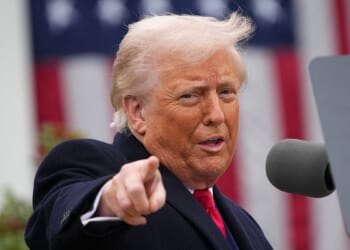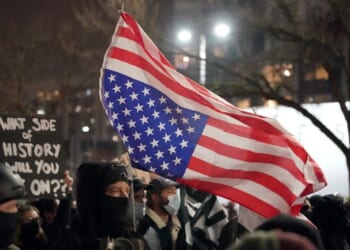
Closing the tabs …
Trump confirms he and Melania will attend Pope Francis’ funeral in Rome pic.twitter.com/cejB2v5Yg6
— Olivier Knox (@OKnox) April 21, 2025
===
“Rest in Peace Pope Francis!” Trump wrote on his social media platform, Truth Social. “May God Bless him and all who loved him!”
Trump also ordered flags be flown at half-staff in memory of Pope Francis at public buildings, military posts, naval stations and ships, and embassies.
“He was a good man, worked hard,” Trump said in comments April 21 at the White House Easter Egg Roll. “He loved the world and it’s an honor to do that.”
Ed: This is a moment for grace, and I’m happy to see Trump set that example. We have plenty of time to assess Pope Francis’ legacy, but in this moment, we should express our appreciation for his dedication to serving the Church and the world as he saw it.
===
JUST IN: CNN’s Dana Bash introduces Nancy Pelosi as “one of the most prominent Catholic lawmakers in American history” to get her reaction on Pope Francis’ passing. Bash then brought up abortion and how Pelosi was denied communion by the San Francisco archbishop. “My next guest is one of the most prominent Catholic lawmakers in American history. Joining me now is the former Speaker of the House, Nancy Pelosi…”
— Collin Rugg (@CollinRugg) Apr 20, 2025
Ed: Yeah, don’t be surprised if some of the cardinals that vote this time around keep this episode in mind, too.
===
“Following the death of the Supreme Pontiff Francis, notice is hereby given that the Eucharistic celebration and the rite of the canonization of Blessed Carlo Acutis, scheduled for April 27, 2025, second Sunday of Easter or Divine Mercy Sunday, on the occasion of the Jubilee of Adolescents, is suspended,” the Vatican press office announced April 21.
The Mass for the Jubilee of Adolescents, however, would still be held, Matteo Bruni, head of the press office told reporters, clarifying that what had been canceled was a Mass for a canonization. The Holy Year and its associated events and Masses would continue, he added. The Jubilee of Adolescents was scheduled for April 25-27 in Rome.
Ed: This will be a terrible disappointment for those making a pilgrimage to participate in Blessed Carlos Acutis’ canonization, but it can’t be helped. At least they can still participate in the Jubilee.
===
Many have asked me today what images or moments make the reel of Pope Francis’s pontificate. There are many: WYD Brazil, his trip to Lampedusa and that to Iraq. But this crossing St. Peter’s Square alone, empty due to the pandemic, in the rain and silence, said a lot. No words needed.
— Ines San Martin (@Inesanma) Apr 20, 2025
===
The period between a pope’s death and the election of a new one is called sede vacante (“the seat is vacant”). During this time, the College of Cardinals oversees the Church’s day-to-day affairs but cannot make any major decisions. The camerlengo seals the pope’s private apartments and prepares a formal document verifying the death. The body of the pope is prepared to lie in state before burial. He is dressed in papal vestments and placed in a coffin, traditionally with a white silk veil over the face.
===
VATICAN CITY—Based on the last handful of papal funerals and conclaves, you may find this (unofficial) schedule helpful:
Day 1: Pope’s Passing & Lying in State Preparation
• Vatican announces the Pope’s death; mourning period officially begins.
• Observe the first official… pic.twitter.com/n4jZxeR3mp— Bree A Dail (@breeadail) April 21, 2025
Ed: These two entries should serve as handy guides to when we can expect the conclave to begin, anyway. The Vatican issued a call for all voting cardinals to arrive by tomorrow morning, but that’s almost certainly to ensure a quorum for any governing issues that may arise over the next couple of weeks.
===
Whether diplomats, theologians, mediators or Vatican insiders, here are 15 cardinals who are among the potential favourites to become the next pope, known as the “papabili”, divided by region.
This list however is by no means exhaustive and Francis’s successor could well be someone else.
Ed: This is the first ‘scorecard’ I saw of the upcoming conclave. Take these with a grain of salt, as only the cardinals themselves know what direction they will take — and even that changes when the doors close. Cardinal Pietro Parolin is Francis’ chief lieutenant and probably the favorite, so his election would mean that the cardinals want continuity. But keep an eye on the bishops of Africa and Asia, who may want a shift back to doctrinal discipline and a focus on the martyrdom of Christians outside of Europe.
===
The next Pope will most likely be someone right inbetween a moderate conservative and a hardline traditionalist.
Pray for a Holy and Saintly Pope. pic.twitter.com/NWASoBrxGM
— Trad West (@trad_west_) April 21, 2025
Ed: I think this may be … optimistic. Bear in mind that ‘conservative’ is a relative position in any government, especially in Europe. But also don’t forget that Francis appointed at least half of the voting cardinals that will participate in this conclave.
===
Now, “whoever is elected will be of a centrally conservative disposition; after 12 years of Pope Francis ‘stirring things up,’” said Serenhedd James, editor of Britain’s Catholic Herald magazine.
“I think the cardinals will want someone who will take a different, calmer approach.”
According to the Rev. Patrick Mary Briscoe, editor of Our Sunday Visitor magazine, the next pope will bring “a renewed clarity of doctrine” to the church and “focused more internally” on its governance.
Ed: Hopefully. This may be more like wishcasting, though.
===
Even before Russia’s full-scale invasion in February 2022, Francis angered Ukrainians, including members of his own hierarchy, by describing the struggle with Russian-backed separatists as a “fratricidal” conflict rather than a case of Russian aggression. Over the last three years, while often bemoaning the plight of “martyred Ukraine,” he avoided blaming Russian president Vladimir Putin for the war and repeatedly suggested that the invasion had been provoked by NATO expansion in Eastern Europe.
He also dismayed many of his followers in China, especially members of the so-called underground church that resists state control, with his overtures to Beijing. Francis’s policy of engagement with the rising superpower reflected his multipolar geopolitical vision, and his efforts culminated in an agreement to share power with the Communist government over the appointment of Catholic bishops. The pope was conspicuously silent on China’s human rights abuses. He referred to the Uyghurs as “persecuted” for the first time in 2020, and his critics contrasted this relative silence with his outspokenness on Western policies.
Ed: This is an excellent essay by my friend Francis X. Rocca, one of the best Vaticanistas and a highly reliable reporter. Be sure to read it all.
===
But many observers believe that Francis will not necessarily be remembered primarily for his progressive actions. He was, after all, not a consistent champion for change: Many critics on the left have charged him with dragging his feet on women’s rights in the church, for example, by appointing token women to high-profile roles rather than opening the institution to more seismic changes. He also moved haltingly when dealing with sexual abuse, spoke harshly at times of “gender ideology,” and was prevented, either by personal belief or by church doctrine, from more fully accepting gay Catholics. He could be considered the most progressive pope in history, but he was still, ultimately, a pope—a man bound by the traditions of an ancient institution.
Instead, experts said, his legacy may be related to something even more unprecedented: his identity as the first Latin American pope.
Ed: Meh. This is from Slate, where the only thing more valuable than progressivism is identity. That would be a meager legacy indeed, if true.
===
As the world absorbs the news of the death of Pope Francis — and before the ever-busy oddsmakers and deep insiders begin the game of papabile speculation that accompanies every papal death and conclave — let us rest for a moment and appreciate what were (arguably) the five most memorable moments of the Franciscan papacy:
5: The Joy of the Gospel. The encyclical “Laudato Si‘” (and its successor, “Laudato Deum“) has gotten wide attention being concerned, as it is, with matters of environment and Christian stewardship. But Francis’ apostolic exhortation “Evangelii Gaudium” actually speaks profoundly to a relevant — truly crushing — issue of our times: Our need to focus on realities over illusions or trending notions and to proclaim Jesus Christ as the incarnate founder of all reality.
Ed: This is also an excellent essay by my friend Elizabeth “The Anchoress” Scalia at Our Sunday Visitor. It’s a fine tribute to the recently passed pontiff.
Also: I have tried to identify and tag all of my posts from the 2013 conclave with the tag “Conclave,” which will obviously also get some use this year. Keep that handy as developments take place in this process.








